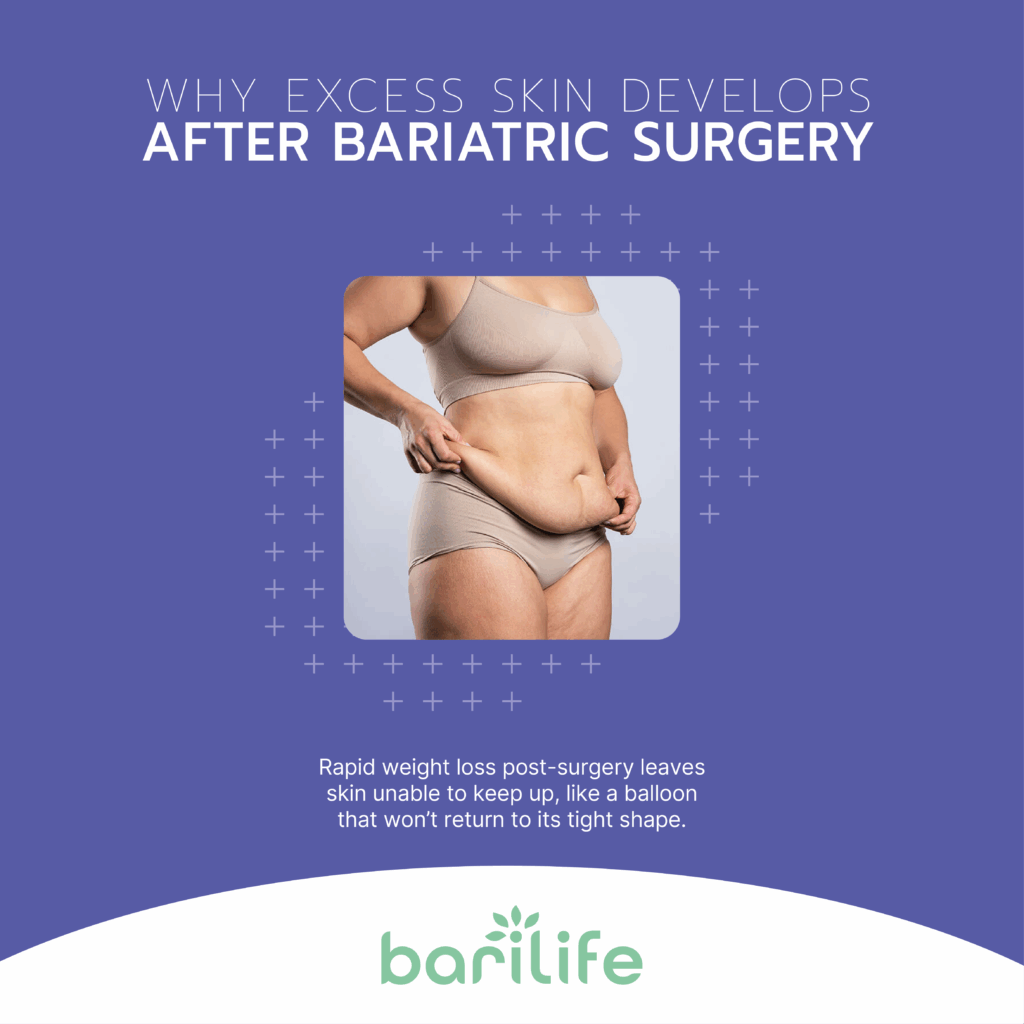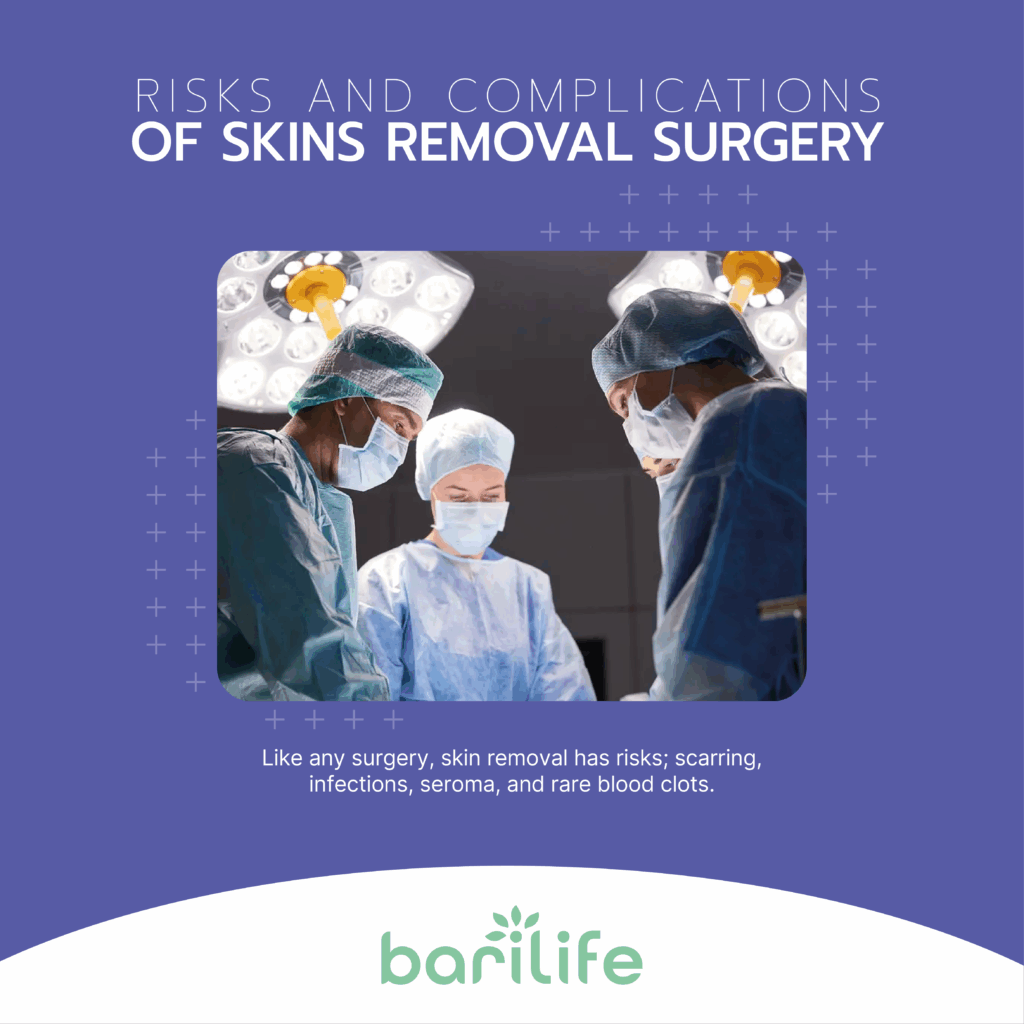Key Takeaways:
- Excess skin after weight loss is normal and happens due to many factors, including rapid weight change, age, and how long you carried extra weight.
- Several different surgical procedures can address loose skin in specific body areas.
- Proper preparation and recovery are essential for successful skin removal outcomes.
Congratulations on your weight loss journey! If you’ve achieved significant results through bariatric surgery, you might be facing an unexpected challenge: loose, excess skin.
This common side effect can affect your comfort, mobility, and confidence. Let’s explore what you need to know about skin removal after bariatric surgery and how to decide if it’s right for you.
Table of Contents
Why Excess Skin Develops After Bariatric Surgery

That hanging, loose skin isn’t a sign that you’ve done anything wrong—it’s actually a natural result of major weight loss. When you lose weight rapidly after bariatric surgery, your skin simply can’t keep up. It’s like a balloon that’s been inflated for a while, and then it’s suddenly deflated. It doesn’t just snap back to its original tight shape.
Several factors can cause this. Age plays a significant role—younger skin contains more collagen and elastin, the proteins responsible for skin’s stretchiness and resilience. As we age, these proteins naturally decrease, making it harder for the skin to retract after being stretched.
The duration of obesity also matters. If you carried extra weight for many years, it means your skin was stretched for a long time, which can permanently damage its elastic properties.
Genetics also affect how your skin responds to weight changes. Some people naturally have more elastic skin than others, so two people who lose the same amount of weight might have very different amounts of loose skin after bariatric surgery.
Types of Skin Removal Procedures
Fortunately, several surgical methods can help address bariatric skin removal needs. These procedures are tailored to target certain areas where excess skin is most problematic.
Abdominoplasty, also called a tummy tuck, is one of the most frequently requested procedures. This surgery removes the apron of hanging skin and fat from your abdomen (sometimes called a “pannus”) and tightens the underlying muscles that may have stretched during weight gain. The end result is a firmer, flatter abdominal profile.
Panniculectomy is similar but focuses solely on removing excess, loose skin and fat from the lower part of the abdomen without tightening muscles. This procedure improves comfort and hygiene, especially if your excess skin causes rashes or infections in the folds. These are common skin issues after bariatric surgery and may persist without surgical intervention.

Brachioplasty, or arm lift, targets the hanging skin on your upper arms. This procedure removes excess skin between your armpit and elbow, creating more toned-looking arms.
Thigh lift surgery removes sagging skin from your inner or outer thighs, reducing chafing and improving the contour of your legs. It can make walking, exercising, and finding clothes that fit much easier.
Other common procedures include breast lifts, lower body lifts (which address the buttocks, outer thighs, and hips in one procedure), and face/neck lifts to address facial sagging that sometimes occurs with major weight loss.
Many people may opt to combine several procedures, either performed together or staged over time, to create comprehensive body contouring after bariatric surgery, when loose skin develops.
Who is the Best Candidate for Skin Removal Surgery?
Not everyone is immediately ready for skin removal after weight loss. Here are important factors that determine if you’re a good candidate.
The first is weight stability. Most surgeons recommend maintaining your goal weight (or being within 10-15 pounds of it) for at least six months before having the removal of excess skin after bariatric surgery. Continuing to lose weight after skin removal could result in new loose skin, while gaining weight could stress your surgical results.
Second, your overall health matters tremendously. You should be free from medical conditions that might impair healing or increase surgical risks. If you have diabetes, it should be well-controlled, and if you smoke, you’ll need to quit well before surgery, since it can significantly affect healing and increase complication risks.
Surgeons will also evaluate you for comorbidities for bariatric surgery, such as high blood pressure or sleep apnea, to ensure these conditions are well-managed prior to elective surgery.
Having realistic expectations is also essential. While these procedures can dramatically improve your body contour, they do leave scars. A good candidate understands this tradeoff and recognizes that the scars are the necessary cost of removing the excess skin.
Benefits of Skin Removal Surgery

The advantages of addressing loose skin through bariatric surgery go far beyond appearances. There’s the improved physical comfort. You’ll experience less chafing, irritation, and discomfort when moving or exercising without excess skin. Many people find they can finally enjoy activities that were previously uncomfortable due to sagging skin after bariatric surgery.
Enhanced mobility also makes daily life easier. Without heavy folds of skin weighing you down or getting in the way, you can move more freely and participate more fully in physical activities, helping maintain your weight loss.
Better hygiene becomes easier to maintain. Excess skin creates folds where moisture, bacteria, and fungus can accumulate, potentially leading to rashes and infections. Removing these folds eliminates these problems and makes everyday hygiene simpler.
Improved body image and self-confidence often follow. After working so hard to lose weight, seeing and enjoying your new body shape without the distraction of hanging skin can be psychologically rewarding and help you fully embrace your transformation.
Preparing for Skin Removal Surgery
Start with a thorough medical evaluation to ensure you’re healthy enough for surgery. This typically includes blood work, a physical exam, and possibly other tests depending on your personal health history.
You’ll need to focus on your nutrition in the weeks leading up to surgery. Protein is especially important for healing, so make sure you’re getting adequate amounts. Some surgeons recommend specific pre-surgery supplements to support recovery.
You also need to review your medications with your surgeon, as some may need to be adjusted or temporarily stopped, as some can increase the bleeding risk.
Finally, you’ll have to prepare your home for recovery by arranging a comfortable resting area, stocking up your pantry with healthy food, and arranging for help during the first few days after surgery.
Risks and Complications of Skin Removal Surgery

Like any surgical procedure, bariatric skin removal surgery comes with potential risks. The top one is scarring, although these do typically fade over time. Your surgeon will place incisions where they can be hidden by clothing when possible, but you should be prepared for visible scarring.
Infection can also occur at incision sites despite preventive measures. Following wound care instructions carefully helps minimize this risk. Seroma formation (fluid accumulation under the skin) is also common and may require drainage in some cases. Blood clots, though rare, are another serious potential complication. You can reduce this risk by walking regularly after surgery.
Recovery Process and Post-Surgical Care
Recovery from post-bariatric surgery skin removal varies depending on which procedures you have. Hospital stays can range from outpatient (going home the same day) to overnight or longer for more extensive procedures.
Your surgeon will recommend appropriate pain medication and provide guidance on when to transition to over-the-counter options.
You can wear compression garments to support your healing tissues and help reduce swelling. Activity restrictions will also be in place for about 4-6 weeks. While gentle walking is encouraged immediately, more strenuous activities, heavy lifting, and certain body positions may be limited during healing.
Conclusion
Dealing with excess skin after bariatric surgery is a common challenge that can affect both your physical comfort and confidence. While non-surgical approaches like exercise and skincare can help minimally, surgical removal is often the most effective solution for significantly loose skin.
For many patients, reviewing bariatric surgery before and after results—including those showing the transformative effects of skin removal—can provide helpful insights into what to expect.
The decision to pursue bariatric skin removal surgery is personal and should be made after careful consideration of the benefits, risks, and timing. Working closely with experienced surgeons who understand the unique needs of post-weight loss bodies can help ensure the best possible results.
Remember that addressing excess skin is the final step in your transformation journey—one that can help you fully enjoy the health benefits and quality of life improvements that your weight loss has made possible.

How Bari Life Can Help
After bariatric surgery, your body already faces challenges in absorbing essential nutrients. Adding another surgery increases your nutritional needs even further as your body works to heal tissue, form new collagen, and fight infection. Bariatric vitamins from Bari Life are specifically formulated to address these unique needs, helping to ensure your body receives the essential micronutrients required during this critical healing process.
Our complete line includes bariatric multivitamins, including options like bariatric multivitamin with iron and bariatric vitamins chewable, which are ideal for those with post-surgical digestive sensitivities. For those who prefer liquid options, we also offer liquid bariatric vitamin formulas that are easy to absorb and gentle on the stomach.
Protein is equally important for surgical recovery, especially after skin removal procedures. Bari Life’s bariatric protein shakes and bariatric protein bars provide the high-quality protein necessary for wound healing, muscle maintenance, and tissue repair. These supplements are designed to be convenient and delicious, making it easier to meet your daily protein goals.
Additionally, to support your ongoing health and wellness, we offer bariatric snacks that fit seamlessly into your post-surgical nutrition plan and bariatric calcium chews to help maintain bone strength—a critical consideration for bariatric patients. Our bariatric probiotic supplements further aid digestive health and nutrient absorption, ensuring your body makes the most of every bite.
Many people don’t realize that nutritional deficiencies can compromise surgical outcomes and extend recovery time. For example, bariatric vitamins for hair loss help address common post-operative concerns like thinning hair, which is often linked to nutrient depletion.
With Bari Life‘s specially formulated supplements, you can confidently approach your skin removal surgery knowing that your body has the nutritional support it needs for optimal healing and long-term recovery.
Take the next step toward completing your transformation journey. Visit Bari Life’s website today to explore our complete line of bariatric-specific supplements, carefully developed to support your best possible surgical outcomes and overall health.
If you want to learn more, why not check out these articles below:
Resources
Managing Excess Skin After Weight Loss Surgery. (2022). Temple Health.



What are your tips and tricks to post-bariatric success?